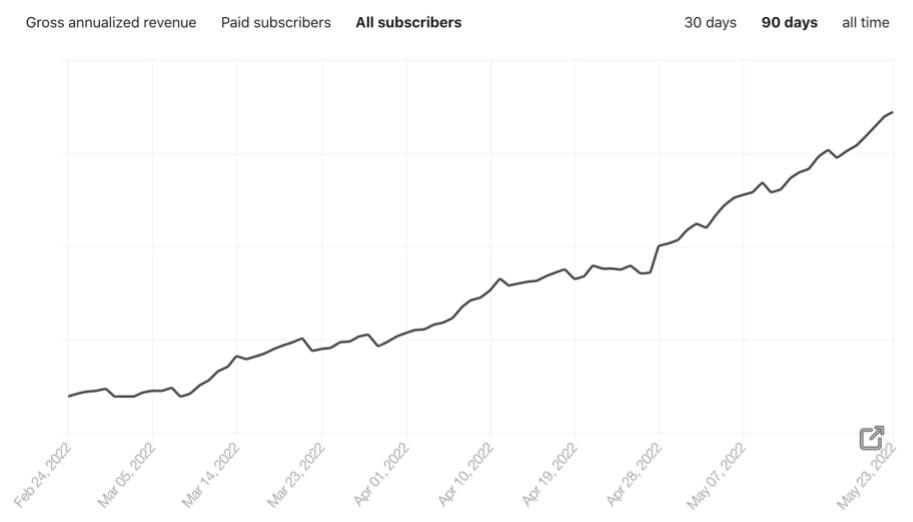Last month, I was invited into a pilot program for Substack writers who have seen some initial success with their newsletters. It’s a group of about 30 folks who have built reasonably sized audiences and made decent money, but haven’t yet reached the Next Level. Our newsletters are largely side hustles—work we do alongside other, better-paying jobs. Still, we all have dreams of making a livable wage from our creative pursuits.
The group is encouraging and surprisingly transparent. Since the program began, we’ve waved to each other through Zoom screens and chatted over Slack. We’ve traded newsletter strategies, shared various metrics, and discussed subscription pricing. It’s been inspiring, eye-opening, and instructive.
More than anything, though, it’s made me want to approach My Sweet Dumb Brain differently.
Not long after introductions began, folks began sharing their newsletter statistics. It was impossible not to compare—to register where I stood in relation to everyone else. For the most part, my numbers are smaller than my peers’. My revenue, lower. (To be fair, there are some cohort members with smaller audiences than mine. But that didn’t make me feel better either! My brain told me that the only reason I have as many readers as I do is dumb luck.)
Then, people started sharing their newsletter strategies. A generous act! And again, I felt less-than. I hadn’t put as much thought into growing my readership or retaining subscribers. I didn’t have the same vision or confidence in My Sweet Dumb Brain as others had in their own ventures. In comparison to my clear-headed peers, it felt like my approach was one of cowardice: write some words, hit publish, cover my face, and peek through my fingers to see what happened.
Over the past few years, I’ve made several decisions under the guise of protecting my mental health. I’ve largely ignored social media—personally and professionally. I’ve stopped myself from setting ambitious goals. I’ve lived a smaller, quieter life.
In early motherhood, especially after my brush with postpartum psychosis, these were wise things to do. I didn’t need to add social media to my list of things to worry about. Personal and professional goals could wait. My top priorities were to build a bond with my daughter, get a better grasp on reality, and learn what it means to be a parent.
Now, a year and a half later, I can confidently say that I’ve achieved those things. But I’m struggling to say or do much else with confidence. It feels like I’ve forgotten how to be social, how to promote my work, and how to set ambitious goals. I’ve lost sight of the old, well-connected version of myself.
Somewhere along the way, I convinced myself that by promoting my work and setting ambitious goals, I would be selling out. I’d be putting my mental wellbeing at risk. The more I believed this, the more I became resentful of the people who posted about their lives and creative pursuits so freely.
Now that I’m part of this writers’ group, I’m thinking differently. I see how much everyone cares about the work they create—and how brave they are to look for ways to reach new readers. The promotion they’re doing isn’t icky. It’s smart. It’s how the world operates.
I’m reframing my resentment, too. In Atlas of the Heart, Brené Brown explains that resentment is a function of envy. When I judged other people who wholeheartedly believed in their work—and promoted that work—I thought I was feeling spiteful. In reality, I was envious. I wanted the confidence to believe in and promote my work, too.
I’m not at risk of selling out. Instead, I’m selling myself short.
Over the past few months, I’ve experienced a slow but steady decline in paying newsletter subscribers. It’s a trickle, but an ongoing one: A small leak at risk of becoming a larger emergency. In a true act of avoidance, I’ve been ignoring it—or, at least, trying to.
But ignoring it doesn’t work. Every time I peek at my subscriber dashboard and see that downward trend, my stomach lurches. Will I eventually reach a point where I can’t afford to write this newsletter anymore?
The more I’ve witnessed other people pour time, energy, strategy, and, yes, self-promotion into their work, the more I realize how much I’ve been short-changing myself. Although I’ve been losing paying newsletter subscribers, I continue to gain new readers. My ideas have value. My essays are worth reading. My work means something.
I put plenty of time and effort into writing newsletter essays, but stop short of anything else. I treat My Sweet Dumb Brain like a lucky-to-be-here side hustle, instead of a legitimate source of revenue.
I owe it to myself, and my family, to take this newsletter venture seriously. I should pour as much effort into making some money from it as I pour into the words and thoughts I share, week after week.
So here we are. There are some changes on the horizon for My Sweet Dumb Brain. For the most part, my weekly newsletters will stay the same. What I’m asking for subscriptions will stay the same, too: $5/month or $45/year. Behind the scenes, though, my editor Becca and I will be putting more effort into attracting new readers, convincing current readers to become paid subscribers, and retaining those paid subscribers. That means some exciting offerings in the future: Sweet Dumb Brain swag, subscriber-only events, and more.
One of my many side gigs is writing case studies about nonprofit newsrooms who have successfully grown their reader revenue (here’s my latest). Time and again, I’ve interviewed professionals who talked about how hard it was to ask for money—and how much easier it got once they started doing it. It’s time I apply those tips to my own work.
Just as it feels uncomfortable to share out loud the things I like about me, it feels uncomfortable to confidently share my writing, seek out new readers, and ask for financial support. But I want to change that. I want to believe in myself and the work I’m doing. And, eventually, I want to be more transparent about my own success (or lack thereof) as a way of opening the door for other creators to achieve their own goals. After all, I know I’m not the only one who struggles with a lack of confidence.
To kick off this new phase of things, I’m running a special offer: 20% off forever. This discount is available only for the next week, ending on May 31. As long as I’m writing My Sweet Dumb Brain, you’ll be locked into this special rate.
And for those of you who are already paying subscribers (thank you!), this is a good time to invite other people to read this newsletter. I adore our thoughtful and heartfelt community and I’m excited to see it grow.
I sincerely hope to write My Sweet Dumb Brain for a long time. Let’s make that happen—together.
xoxo KHG








Oh hey, we share the same newsletter strategy, how fun!
I’ve been mulling over the same things for my work. It’s so hard! When I was younger I got made fun of for being really proud of the clubs I was in or the work I did. It still feels wrong to be confident in my work. Why is this the way we view others who are passionate about something? I suspect it’s the same thing you mentioned about resenting others for their sparkly stats: envy.
I hope you achieve everything you set out to do! And I am stoked for some swag. 😎
So funny how success works. I felt such a pang of jealousy hearing about this program and not being invited to it. From where I write, I look to your newsletter as a goal. And in regards to strategy, I feel you deeply. I wish I had more to give to paying subscribers. I wish I had endless pitch ideas for how Shangrilogs, or even just my writing in general, would fit into larger publications. I've fantasized about going back to school to be a wildlife biologist to strengthen some of the pieces. And at the same time, berate myself for not re-allocating "newsletter time" to "novel time."
At the end of the page, I recommend your newsletter via mine because it's great. Your free subscribers show that. Your work is worth paying for, and I'll continue to promote it as such.